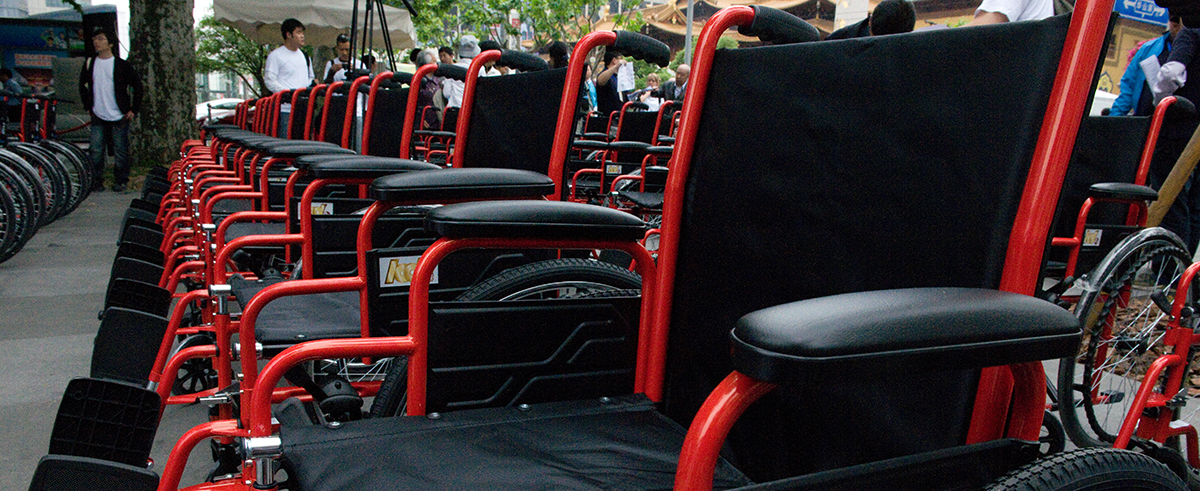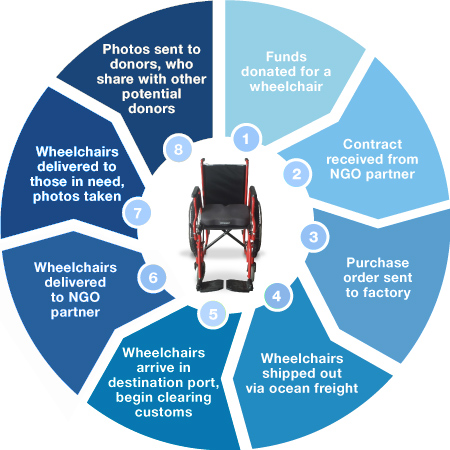
Wheelchair Donation Cycle

All wheelchairs feature the following:
- Removable armrest and swing-away footrest
- Red powder-coated frame
- Black nylon fire resistant upholstery
- Front wheel with polyurethane tires
- Rear mag wheel with solid tires
Our wheelchairs average 45 pounds, are constructed of powder-coated steel tubing and are built with the intention of being low maintenance. They are foldable for ease of transport and are equipped with removable arm rests, swing-away footrests, solid rubber tires, composite rims, sealed bearings and heavy duty front casters for use on non-flat terrain. We can purchase and deliver a wheelchair to our distribution partners worldwide for an average of $200. This wheelchair would normally cost $600 in the U.S., but the large quantities that we purchase allow us to deliver each one for roughly $200, by a 280-wheelchair sea container. This same type of wheelchair sells for up to $1,700 US in some developing countries.
The need for proper fitting of wheelchairs for persons with special needs and specific afflictions is very important. For this reason we offer wheelchairs in varying seat widths. Our wheelchairs are built in 5 sizes; 12, 14, 16, 18, and 20 inch seat widths. The 12- and 14-inch wheelchairs are typically given to children and small adults; 16-, 18- and 20-inch are typically given to adults. We allow the organizations that distribute the wheelchairs to specify the particular quantities of each size wheelchair that will best suit the recipients they have identified. We also make our distribution partners aware that our wheelchairs are not meant for use by individuals with extreme disabilities such as CP, Polio (in some cases), spinal cord injuries, or motor control disabilities, etc. These individuals may require special seating devices, or more specialized wheelchairs. We do, however, leave the final decision up to the distributing organization as to the appropriateness of our wheelchairs for the end user. We have found that the majority of the individuals we serve will benefit from the receipt of a standard manual wheelchair. A small percentage of these individuals require much more specialized devices. We also find that in any given population, when asked to identify individuals with disabilities the most extreme examples are typically brought forward first. We do encourage our partnering organizations to seek the assistance of qualified Physical Therapists and Occupational Therapists in their country to assist in the distribution of the wheelchairs.
When giving a wheelchair to a recipient it becomes necessary to weigh the benefit of simply having a wheelchair against not having a wheelchair at all. Consideration must also be given to the benefits to the family of the recipient as well. Does the wheelchair enable the family to better care for the recipient? Does receiving a wheelchair mean that a caregiver will no longer have to physically carry a recipient everywhere they go, be that to fields to work, doctor’s appointments, or to the bathroom? Does the receipt of a wheelchair allow a recipient beneficial mobility (exposure to family and community), even if that means only the limited ability to sit in a family room or outside their home, rather than lay on the floor or bed all of the time, etc? Please realize that the vast majority of the wheelchairs we distribute go to undeveloped nations. The westernized world enjoys the benefits of advanced medical technology and the availability of many solutions to mobility issues. In the developing world this is simply not the case. All too often a wheelchair is financially unobtainable or unavailable even if funds are available. The individuals who receive our wheelchairs cannot afford to purchase one on their own, or do not have access to a source for wheelchairs. Many of the people receiving wheelchairs from us are receiving a wheelchair for the very first time in their lives, be they 5 years old or 75 years old.
If a recipient receives a wheelchair and chooses not to use it for one reason or another, that is beyond our control. At the time of distribution an assessment is made as to the genuine need for the recipient to receive a wheelchair. Most recipients have been identified before the wheelchairs actually arrive in their country as worthy recipients in need. When we give the recipient a wheelchair it becomes their property and its use is left to their discretion.
For further information please contact us at in**@******************on.org or (925)736-8234.
